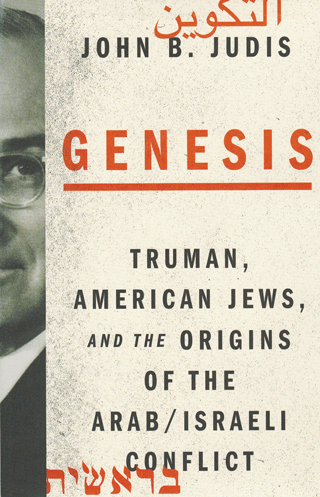Genesis: Truman, American Jews, and the Origins of the Arab/Israeli Conflict, by John B. Judis, Farrar, Strauss and Giroux, 432 pages, $30
Reviewed by NEAL GENDLER
Like many Jews of a certain age, I was raised with esteem for President Harry Truman and gratitude for his near-instant recognition of Israel.
Indeed, Truman accorded de facto recognition 11 minutes after Israel came into being. But Truman long had opposed creating a Jewish state because he didn’t believe in religion-based nations, and he dithered until nearly the last month, says John Judis in Genesis.
“Truman was a genuine liberal who had moral questions about Zionism,” says Judis, a senior editor at The New Republic. “He was also the last president to express them.”

Judis has no qualms; his condemnations of Jews for displacing Arabs in the land are spread across half the 372 pages of text.
Long after it became unfeasible, Truman still favored a U.S.-British proposal, although I can’t determine whether Judis means the trusteeship idea or the federation of autonomous Jewish and Arab areas with a joint legislature, Britain controlling Jerusalem, Bethlehem, the Negev and immigration, finance and foreign relations.
Zionist pressure was unrelenting and by 1947, Judis says, Truman had become “disgusted with anything related to Palestine.” Strident Rabbi Abba Hillel Silver so angered Truman that eventually, he refused to see him.
Truman was caught between “an increasingly militant and growing Zionist lobby” — backed by some of his advisers — and the opposition of his State Department. Secretary of State George Marshall pressed for a temporary United Nations trusteeship even in early May 1948.
But we don’t get to Truman until page 185, after sections titled “Two Peoples and One Land” and “The Paradox of American Zionism.” They are detailed stage-setting for part three, “Truman and Israel,” but they also display Judis’ apparent discomfort with Zionist lobbying and his moral argument against Israel.
Although he says early on that when Zionist Jews began arriving in the late 1800s in the Turkish-ruled country, Palestinian Arabs had little sense of national identity, he accuses the Jews of scarcely seeing them. So does Ari Shavit in his brilliant My Promised Land, but with sympathy for Arabs and sorrow for the necessity of Jews displacing them. Judis mostly has venom for the displacers.
“From the 1890s, when Zionists first settled in Palestine with the express purpose of creating a Jewish state where Arabs had lived for centuries, until the early 1930s, the responsibility for the conflict lay primarily with the Zionists,” Judis says. “They initiated it by migrating to Palestine with a purpose of creating a Jewish state that would rule the native Arab population,” which he puts at 575,000.
The land was not empty, as Jews told themselves, but settlement was very sparse, as shown in photos, including German and British aerial shots from 1917 and 1918. Jerusalem, the largest town, had 10,000 inhabitants. Judis acknowledges that as Jews created a state in waiting and a growing economy, the Arabs did not. But “Zionism as a national liberation movement for oppressed Jewry… obscured its role as a settler-colonial movement that had displaced or driven out a native population.” (About 1.6 million Arabs now live in Israel.)
The “paradox” of American Zionism, Judis says, is that “Jews who were noted liberals in America… seemed oblivious to the darker side of Zionism, to the attempt to impose a Jewish state on a people who had lived in Palestine for 1,300 years.”
Even more: With the Balfour Declaration, “the British and Zionists had conspired to screw the Arabs out of a country that by the prevailing standards of self-determination would have been theirs.” He says that wrong hasn’t been redressed and until it is, there’ll be no peace.
Judis says Genesis is “primarily about what Americans can learn from the failure of the Truman administration to resolve the conflict between Zionism and Arab nationalism,” as if it was America’s to resolve. He well documents the struggle for Truman’s recognition decision, but he calls recreating Israel in its historical homeland unjust. Again and again.
One might ask whether Judis, a Jew with “no religious allegiance to Judaism,” believes Jews deserve a nation at all. If so, where?
***
Neal Gendler is a Minneapolis writer and editor.
(American Jewish World, 2.28.14)


















